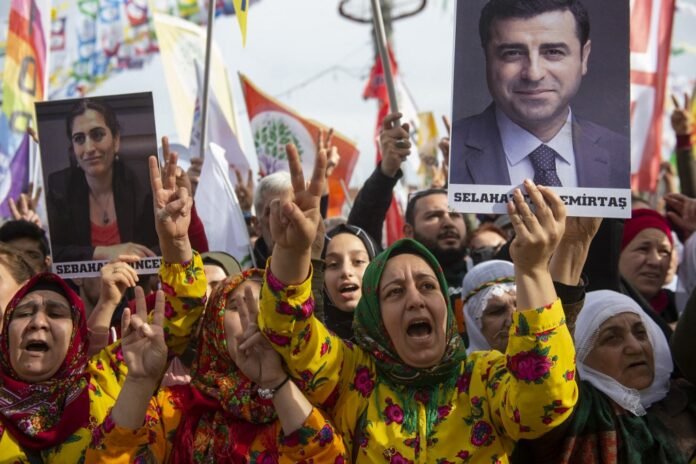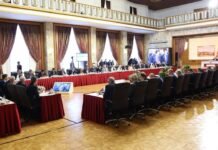
Three international rights groups are urging a cross-party parliamentary commission in Turkey to recommend sweeping legal and institutional reforms aimed at protecting Kurds and other communities and strengthening the rule of law as the country moves to end a four-decade conflict with Kurdish militants.
In a joint briefing released Thursday, Human Rights Watch (HRW), the Turkey Human Rights Litigation Support Project (TLSP) and the International Commission of Jurists (ICJ) called on the National Solidarity, Brotherhood and Democracy Commission, a parliamentary body established to oversee the peace efforts, to prioritize changes they say are needed for a “durable, rights-based peace.”
“Bringing an end to the four-decade Kurdish conflict requires not just ending fighting but concrete steps to change laws that have long been used to bring criminal charges against and incarcerate Kurds and other groups for nonviolent political activity and speech,” Hugh Williamson, Europe and Central Asia director at HRW, said. “The cross-party commission has a unique opportunity to help shape a post-conflict society and should make bold recommendations to repeal abusive laws used to silence and marginalize people.”
The parliament established the commission in August 2025 after the Kurdistan Workers’ Party (PKK) announced its intention to disarm and disband. Although the commission has begun its meetings, President Recep Tayyip Erdoğan has yet to take concrete steps toward political reform following the PKK’s decision in February. The pro-Kurdish Peoples’ Equality and Democracy Party (DEM Party) has demanded that the commission hear Abdullah Öcalan, the jailed leader of the PKK, directly.
HRW, the TLSP and the ICJ said their briefing, “Advancing Human Rights, Justice and Democracy for Kurds and All Other Communities in Türkiye,” draws on years of litigation, monitoring and documentation of human rights violations and attacks on judicial independence in Turkey. They argued that certain criminal law provisions have been applied in discriminatory and politically motivated ways, particularly against Kurds and others perceived as dissenting voices.
The organizations emphasized four main areas where they say structural reforms are urgently needed.
First, they urged the commission to push for reforms to Turkey’s anti-terror legislation, including repealing or substantially amending what they describe as vague and overbroad provisions. These provisions, they said, have been used to investigate, detain, prosecute and convict a wide range of people with no material connection to armed groups. Those targeted have included journalists, lawyers, human rights defenders, political activists and individuals who have peacefully expressed their opinions.
The group cited multiple examples, including the Taner Kılıç v. Turkey case at the European Court of Human Rights (ECtHR), in which a human rights lawyer and Amnesty International board member was prosecuted without credible evidence of violent activity.
The group also pointed to the prosecution of the Istanbul Bar Association’s Executive Board in 2025 for “spreading terrorist propaganda” — an example they say shows the law being weaponized against lawyers performing legitimate professional duties.
Second, the groups called for an end to what they describe as the misuse of criminal law against elected officials, especially members of pro-Kurdish parties. They cited a pattern of opposition politicians — including members of parliament, mayors and city council members — being arbitrarily detained, prosecuted or removed from office on the basis of political speech or peaceful activities. The briefing says the commission should make clear that removing or restricting an elected official’s mandate must be an exceptional measure, based on compelling evidence of serious criminal wrongdoing, subject to effective judicial review and consistent with international standards guaranteeing free and fair elections and political participation.
They cited the mass trial of Kurdish politicians in the so-called Kobani case, in which dozens of former members of the Peoples’ Democratic Party (HDP), including co-chairs Selahattin Demirtaş and Figen Yüksekdağ Şenoğlu, were convicted in April 2024 on charges of inciting violence during 2014 protests, despite ECtHR rulings that their detention was politically motivated.
Third, the briefing urges measures to guarantee the right to peaceful assembly. The groups criticized what they called systemic restrictions on public assemblies and demonstrations and the frequent, sometimes violent, dispersal of peaceful protesters by police. They recommended that the commission seek reforms to the Law on Meetings and Demonstrations and related practices so that authorities treat public demonstrations as a normal part of democratic participation and “evidence of an engaged and pluralistic society.”
Finally, the briefing called for the abolition of aggravated life sentences that exclude any prospect of release, saying the system violates human dignity and international human rights standards.
According to civil society data cited in the report, more than 4,000 prisoners in Turkey are serving such sentences, many convicted in cases related to the PKK conflict. Under current law, they are not eligible for parole or conditional release, regardless of rehabilitation or conduct.
The ECtHR has repeatedly found that Turkey has violated Article 3 of the European Convention on Human Rights (ECHR) — which prohibits inhuman or degrading treatment. The Council of Europe’s Committee of Ministers has also urged Turkey to introduce a system of meaningful sentence review.
The groups called for legislative amendments ensuring that prisoners sentenced to life be considered for release after 25 years, subject to fair and periodic review, and said such reform would “mark a vital step toward reconciliation and a rights-based peace.”
“The dialogue process between the parties to the conflict presents a historic opportunity to begin dismantling the entrenched cycle of violence and legal exceptionalism,” Ayşe Bingöl Demir of the TLSP said. “The commission should draw on the available expertise from civil society, lawyers’ groups and academics and take an inclusive and wide-ranging approach to advocating for comprehensive reforms that uphold human rights and the rule of law, and that are necessary to underpin a sustainable peace.”
Beyond those four recommendations, HRW, the TLSP and the ICJ raised two broader, cross-cutting concerns they say the commission should address: judicial independence and accountability for serious human rights violations.
On judicial independence, the briefing calls for concrete steps to ensure the judiciary is institutionally protected from undue influence and able to uphold the rule of law for everyone without interference or discrimination. The groups argue that past reforms have failed to fully shield judges and prosecutors from political pressure.
On accountability, the briefing urges the commission to tackle what the groups describe as long-standing impunity for serious abuses committed during the conflict with the PKK including violations by state agents and by armed groups. It calls for credible avenues for justice as well as mechanisms for truth-telling, as “necessary conditions for building a rights-based and democratic future.”
“To fulfill its mandate, the commission should go beyond symbolic recommendations by addressing the structural injustices and discriminatory legal frameworks that have sustained decades of conflict, repression and impunity,” Temur Shakirov, Europe and Central Asia program director at the ICJ, said. “Achieving a durable peace requires dismantling these foundations and, instead, establishing enforceable human rights guarantees and ensuring accountability and democratic inclusion.”














